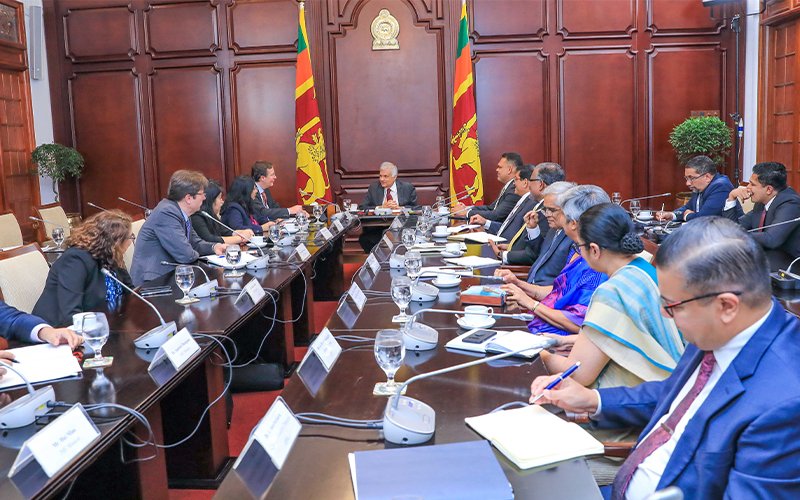
IMF applauds Sri Lanka’s progress in economic reform and governance
Officials of the International Monetary Fund (IMF) who are currently in Sri Lanka have congratulated Sri Lanka on the completion of its first review within its programme.
During a meeting held with Sri Lankan President Ranil Wickremesinghe representatives from the IMF acknowledged commendable efforts made by Sri Lanka in implementing challenging reforms, which have had a significant impact on the domestic population, the President’s Media Division said.
Furthermore, directors at the executive board commended Sri Lanka for its pioneering effort in Asia by publishing a governance diagnostic report.
Peter Breuer, Senior Mission Chief for Sri Lanka, pointed out encouraging signs regarding the program’s impact on stabilizing the economy, particularly in policy-oriented variables and fiscal aspects. Recent meetings revealed promising revenue collection, indicating the effectiveness of policies put in place since reaching a staff level agreement in the second half of 2022. The IMF underlined the favorable surprise in these developments, boosting confidence among the international community, official creditors, and private creditors.
Breuer conveyed to President Wickremesinghe that, “With respect to revenue collection, in fact, we had a meeting that showed very encouraging numbers that basically highlight that the policies you implemented beginning from after we reached the staff level agreement in the second half of 2022 are working, that they have the intended effect, that you’re collecting the revenue that’s needed to address the cause of the crisis. So, that really is very good news.”
The board meeting recognized Sri Lanka’s success in significantly reducing inflation, crediting the government’s efforts in monetary policy and reducing monetary financing. Positive outcomes, including an increase in reserves, were also noted. The ongoing governance reforms were seen as positive indicators, contributing to tentative economic growth in the third quarter, particularly in capital formation and machinery.
As the IMF prepares for its upcoming formal review and Article 4 consultation, key areas of focus include the new public financial management law, potential conflicts with the public-private partnership law, electricity tariffs, and urgent preparations for property taxation. The IMF emphasized the importance of perseverance in ongoing reforms, addressing fiscal issues, and advancing governance agendas.
Over the course of the two-week mission, further discussions between Sri Lankan authorities and the IMF will delve deeper into these key areas, providing a comprehensive overview of the progress and challenges in Sri Lanka’s economic reform journey.




Leave A Comment